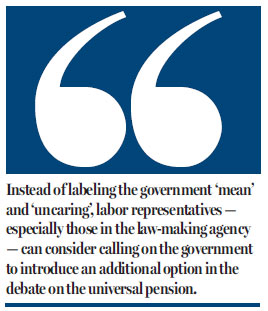Time to make Hong Kong a fairer society for everyone
Updated: 2016-01-14 08:05
By Peter Liang(HK Edition)
|
|||||||
The government earlier issued a consultation paper on a universal pension scheme in order to invite public discussions on the topic that will have a far-reaching social and economic effect.
In the paper, the government has made clear its stand on the issue, arguing that a universal pension scheme would impose too much of a burden on public finances which would have to be met by raising taxes. Instead, it proposes the adoption of a means test to limit coverage of the scheme only to retirees who are most in need.
As such, the public is given a choice of either paying higher taxes in future to help fund a universal pension scheme or accepting a restricted one that would effectively exclude most taxpayers. Unsurprisingly, the government's declared position has triggered a storm of protest from various workers' groups. What is surprising is that the consultation paper has made no mention of the role that private sector employers can play in providing better pension benefits to their employees.
In fact, the civil service has one of Hong Kong's best retirement plans in place. A former financial secretary once explained that such a plan was needed to compete for top talents with the private sector, which could offer higher salaries and other benefits such as annual bonuses.
In Hong Kong, the law only requires that employers contribute to the Mandatory Provident Fund (MPF) and the limit is set at HK$1,500 a month, which is widely seen to be too little to be of much help to most retirees. Only a few large corporations, including the big local banks and utility companies, see the need to establish their own comprehensive retirement schemes for their employees. In other companies that employ a large workforce, the employees' unions are large enough to bargain effectively with employers for pension and other benefits. But the majority of Hong Kong workers are employed at small- to medium-sized companies which provide only the basic retirement benefits required by the labor law.
There is no shortage of organized labor unions in Hong Kong. The better-established groups on either side of the political spectrum are well represented in the Legislative Council. But none of them have ever had the gall to directly challenge the powerful employers' groups which have always maintained that industrial actions are counterproductive and the government should get involved in labor relations only at times when the law is seen to be breached.
Instead of labeling the government "mean" and "uncaring", labor representatives - especially those in the law-making agency - can consider calling on the government to introduce an additional option in the debate on the universal pension. That option would call for the passing of a new law requiring private enterprises to establish their own employee pension schemes.
Such corporate retirement plans should be designed to supplement, rather than to replace, the existing MPF and a government-funded pension scheme for retirees passing the means test.
To distinguish from MPF, which is a pre-funded contribution benefit scheme, a corporate-sponsored program should be structured as a defined benefit scheme similar to the one for the civil service.
It can be expected that employers would stage a fierce fight against the proposal of a mandatory corporate pension program that would push up operating costs and, being unfunded, could incur additional risks. But even the staunchest defenders of Hong Kong's capitalist system cannot afford to ignore the seething public discontent arising from the widening wealth gap and the growing ranks of impoverished retirees.
These die-hard capitalist and free market worshippers are the ones who have kept reminding the government it should stay out of their affairs. But they also passionately complain that social and political rifts are hurting business. They are the same people who are perfectly happy to shift the responsibility of caring for their employees to the government and, at the same time, have made known their loathing for any tax hikes.
If they can have their cake and eat it, then the workers want a piece too.
The author is a veteran current affairs commentator.

(HK Edition 01/14/2016 page5)